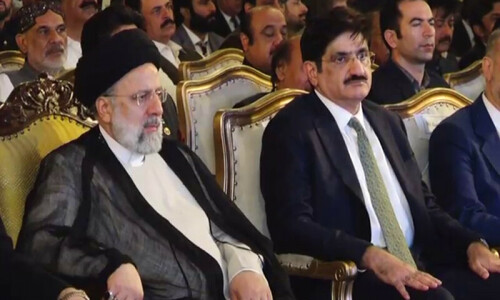ISLAMABAD: The government plans emergency measures against repeated nationwide power breakdowns, but weaknesses related to the Sibi-Guddu-Quetta transmission lines are likely to remain unresolved for the time being.
These technical limitations of the national transmission system had emerged following inauguration of a 400MW power project at Uch by the prime minister without completion of basic infrastructure – the transmission line that was to take additional load and the gas field, officials conceded.
Take a look: Herald: Gridlocked – how power is lost in Pakistan's distribution lines
Water and Power Secretary Younas Dagha told journalists here on Tuesday that the power ministry had finalised an emergency plan for safeguard measures to be introduced at the generation, transmission and distribution points to avoid repetition of countrywide power failures.
He was speaking at a consultative session with former and serving engineers of the National Engineering Services of Pakistan and the National Transmission and Dispatch Company and USAID consultants on safeguard techniques and technologies.
The secretary said the safeguard measures for all these three segments of the power system would be synchronised in two to three days and presented to the cabinet committee on energy for approval.
The emergency safeguard measures, he said, would be implemented by generation, distribution and transmission companies and independent power producers at their end in two to three months.
Mr Dagha said the government had promised to provide whatever resources were required to introduce these measures
that should isolate problematic areas, instead of resulting in cascading effect throughout the country. “Even then 100 per cent cascading breakdowns cannot be ruled out which also happen even in developed countries.”
Responding to a question, the secretary said: “The basic flaw in the country’s power system is in the tight demand and supply situation so the system always remained on the edge because the national grid faced overloading and under-loading, in both cases leading to tripping.” This needed to be restricted at the localised level, he said.
“Even today, Uch Power plant is getting unprocessed gas that is mixed with separate processed flows,” an official said. “The critical transmission line that was necessary to stabilise the grid is not in place even today. This 70km line should have been completed before allowing Uch Power to achieve commercial operation.”
This is resulting in congestion in the system and hence the NTDC is never able to take full 920MW capacity of two Uch plants. It has to reduce Uch intake by 200-250MW to protect the system, but keep on paying capacity charges for 900-920MW.
A technical expert also confirmed this in the presence of the water and power secretary at the consultative session that the NTDC has to keep power procurement from Uch plants between 600-700MW to avoid overloading.
The prime minister had inaugurated Uch-II power project in April last year even though experts had advised against it and warned about its repercussions. It was advised at the time that a force majeure by the OGDCL on security reasons could save the NTDC from liquidity damages for failing to undertake the transmission line.
The 70km transmission line from Shikarpur to Sibi to evacuate electricity is still non-existent because of faults on part of the state-run NTDC and the OGDCL had not completed the required above surface facilities for gas gathering and processing and H2S removal.
Uch Power is now entitled to capacity payments for 988MW (of two plants) without providing more than 650MW energy because of faults on part of government entities. If the parties take the risk of transmitting more than 700MW, the national grid would hardly sustain the pressure and collapse with cascading power breakdowns throughout the country.
Even if the unprocessed gas was made available, the NTDC’s failure to lay 70km of required 220kVA transmission line has created a bottleneck because it cannot transmit more than 700-750MW on a sustainable basis without exposing the national grid. Precisely this has been a major reason behind four nationwide power breakdowns in tandem.
Published in Dawn January 28th, 2015
On a mobile phone? Get the Dawn Mobile App: Apple Store | Google Play












































